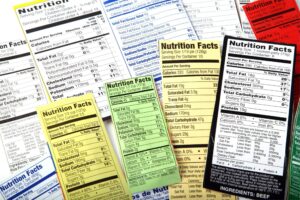+86 571 8659 2517
+86 180 5841 8258
info@zmuni.com

On September 16, 2025, China's General Administration of Customs (GACC) released its list of non-compliant imported food products for August 2025. A total of 617 batches from 52 countries and regions were denied entry, representing a month-on-month increase of approximately 30% (up 141 batches from 476 in July) and a year-on-year increase of about 105% (up 316 batches from 301 in August 2024). The majority of non-compliant products originated from Ecuador (18.5%), followed by Japan (8.9%), the U.S. (7.8%), and Italy (6.0%). Key reasons for import rejections included: Non-compliance with national food standards (167 batches) Unqualified labeling (156 batches) Detection of

On September 25, 2025, China's National Health Commission (NHC) released two official Q&A documents on major food labeling standards: GB 28050-2025 National Food Safety Standard - General Rules for Nutrition Labeling of Prepackaged Foods GB 7718-2025 National Food Safety Standard - General Standard for the Labeling of Prepackaged Food Both standards were part of Announcement No. 2 of 2025, issued on March 27, which introduced 50 new national food safety standards and nine amendments. The newly published Q&A clarifies their application and interpretation, helping ensure accurate implementation before they take effect on March 16, 2027. More information: Unpacking China's GB7718

On September 25, 2025, China's National Health Commission (NHC) and State Administration for Market Regulation (SAMR) jointly issued Announcement No. 6 of 2025, formally releasing 32 new national food safety standards and 2 amendment sheets. The 32 standards are as follows: GB 14881-2025 General Hygienic Specifications for Food Production GB 17405-2025 Good Manufacturing Practice for Health Food GB 5009.1-2025 Physical and Chemical Analysis - General Principles GB 2762-2025 Maximum Levels of Contaminants in Foods GB 29922-2025 General Standard for Foods for Special Medical Purposes GB 31662-2025 Total Nutritional Formula Food for Tumor Patients GB 1903.76-2025 Food Nutrient Fortifier -

On September 24, 2025, China's National Institutes for Food and Drug Control (NIFDC) issued the Technical Guidelines for Dossier Requirements on the Registration and Notification of New Cosmetic Ingredients (Draft for Comment) and opened them for public consultation. The consultation period will remain open until October 19, 2025. The Draft Guidelines introduce further improvements and clarifications in key areas, including the classification of application scenarios, dossier submission requirements, use of existing data, adoption of new technologies and methodologies, and recordkeeping obligations. One of the most noteworthy updates is the optimized classification of new cosmetic ingredient (NCI) application scenarios,

On September 17, 2025, China's National Medical Products Administration (NMPA) announced the rollout of the second phase of its personalized cosmetics pilot program. Starting October 1, designated enterprises in 15 regions will be allowed to provide on-site formulation services for already notified general cosmetics. The program will run for two years. 01 What Is Personalized Cosmetics Service? Under the pilot, approved enterprises may carry out small-batch mixing, repackaging, and other simple services for at least two notified general cosmetics at designated retail locations, based on individual consumer needs. Children's cosmetics, eye-area products, and cosmetics containing new ingredients are excluded. Only

On September 19, 2025, China's National Medical Products Administration (NMPA) released the Opinions on Deepening Cosmetics Regulatory Reform and Promoting High-Quality Development of the Industry (Draft for Public Comment). Stakeholders can submit comments to hzpjgs@nmpa.gov.cn by October 10, 2025. The Draft sets reform goals for 2030 and 2035 and outlines 24 reform measures across 5 key areas, including strengthening innovation support and improving registration and filing efficiency. The proposal has attracted significant attention from the cosmetics industry. Background Cosmetics are not only key to meeting consumers'pursuit of beauty but also an important part of improving quality of life. To coordinate

From September 11 to 17, 2025, 5 new cosmetic ingredients were notified with the China National Medical Products Administration (NMPA). The technical requirements for the 5 new cosmetic ingredients mentioned above have not been disclosed, and they have not yet entered the safety monitoring period. Filaggrin Filaggrin is a key protein involved in keratinocyte differentiation and the function of the epidermal barrier. It can be degraded into free amino acids, which, along with their derivatives—such as urocanic acid and pyrrolidone carboxylic acid—combine with other humectants to form the natural moisturizing factor, supporting hydration of the stratum corneum. Pleione bulbocodioides Stem Extract

On September 15,2025, China's National Institutes for Food and Drug Control (NIFDC) has released 18 draft cosmetic standards for public consultation. The public consultation period will remain open until October 9, 2025. The drafts include newly added prohibited ingredients, revised microbial limits for eye, lip, and children's cosmetics, and adjusted usage limits for certain permitted, restricted, and prohibited substances. Detailed standards are as follows: Modification Type No. Name Remark Eye, Lip, and Children's Cosmetics 1 Microbial Limits for Eye, Lip, and Children's Cosmetics China's Safety Technical Standards for Cosmetics(STSC) currently set a microbial limit of 500 CFU/g (or CFU/mL) for eye, lip, and
+86 571 8659 2517
+86 180 5841 8258
info@zmuni.com